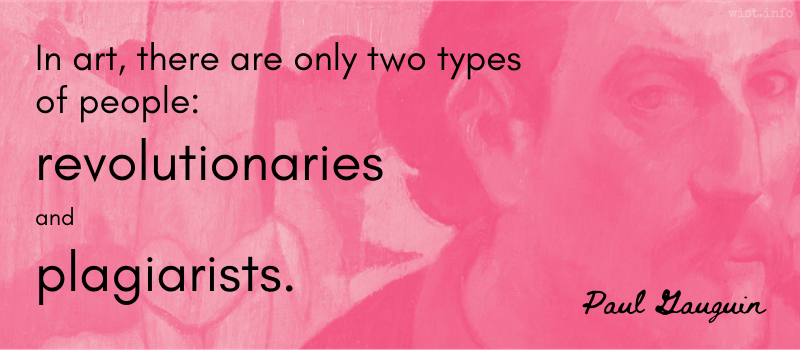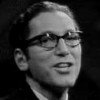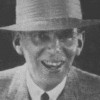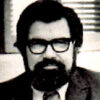Of all authors, I despise none more than the compilers, who go off in all directions looking for bits and pieces of other writers’ works, which they then stick into their own, like pieces of turf into a lawn; they’re in no way superior to those printer’s typesetters, who arrange letters which, combined together, make a book, to which they contributed only the manual labour. I would like the original texts to be respected; I feel it’s a kind of profanation, to extract the pieces which make them up from the sanctuary where they belong, and expose them to a contempt they do not deserve. When a man has nothing new to say, why does he not keep silent?
[De tous les auteurs, il n’y en a point que je méprise plus que les compilateurs, qui vont, de tous côtés, chercher des lambeaux des ouvrages des autres, qu’ils plaquent dans les leurs, comme des pièces de gazon dans un parterre: ils ne sont point au-dessus de ces ouvriers d’imprimerie qui rangent des caractères, qui, combinés ensemble, font un livre où ils n’ont fourni que la main. Je voudrois qu’on respectât les livres originaux; et il me semble que c’est une espèce de profanation de tirer les pièces qui les composent du sanctuaire où elles sont, pour les exposer à un mépris qu’elles ne méritent point. Quand un homme n’a rien à dire de nouveau, que ne se tait-il?]Charles-Lewis de Secondat, Baron de Montesquieu (1689-1755) French political philosopher
Persian Letters [Lettres Persanes], Letter 66, Rica to *** (1721) [tr. Mauldon (2008)]
(Source)
It is unclear what Montesquieu / his character would have thought of quotation collections.
(Source (French)). Alternate translations:
Of all Authors, there is none I despise more than the Compilers, who forage far and wide for Scraps of other Men's Works, which they piece into their own, like so many Dabs of Green Turf in a Flower-garden: they are not a whit superior to those that work in a Printing-house, who distribute the Types, which being put together make a Book, towards which they furnish'd nothing but Manual Labour. I am for having Original Authors reverenc'd: and, in my Judgment, 'tis a sort of Prophanation to drag, as it were out of their Sanctuary, Pieces of their Works, and expose them to a Contempt which they deserve not. If a Man has nothing new to say, why don't he hold his Tongue?
[tr. Ozell (1736 ed.), # 64]
Of all kind of authors, there are none I despise more than compilers, who search every where for shreds of other men's works, which they join to their own, like so many pieces of green turf in a garden: they are not at all superior to compositors in a printing house, who range the types, wh:ch, collected together, make a book, towards which they contribute nothing but the labours of the hand. I would have original writers respected, and it seems to me, a kind of profanation to take those pieces from the sanftuary in which they reside, and to expose them to a contempt they do not deserve. When a man hath nothing new to say, why does not he hold his tongue?
[tr. Floyd (1762)]
Of all the authors, there are none whom I despise more than compilers. They crowd from all quarters to pick up the shreds of other men’s works; these they fit into their own, as one would patch the turf of a lawn: they are not one whit superior to the compositor, whose type-setting may be called book-making if manual labor is all. I would have original books respected; and it seems to me a species of profanation, to take from them the matter of which they are composed, as if from a sanctuary, and expose it to an undeserved contempt. When a man has nothing new to say, why can’t he be quiet?
[tr. Davidson (1891)]
There is no class of authors I despise more than I do compilers, who come from every side to search for the fragments of other men's works, which they wedge into their own, just as you would introduce patches of turf into the border of a flower-plot. They are not superior to printers who arrange characters in such a way as to produce a book, but whose manual labor has been all that has entered into its composition. I would have original books respected. It is a kind of profanation to tear from them the parts of which they are composed, as if from a sanctuary, and thereby expose them to a contempt they do not deserve.
[tr. Betts (1897)]
Of all authors, I most despise the compilers, who search everywhere in the works of others for fragments which they then fit into their own, much as you would piece turf into a lawn. They are no better authors than the printers who select and combine letters and thus, contributing only their manual labor, make a book. I would have original books respected, and it seems to me that there is something profane in tearing constituent pieces from their sanctuary and exposing them to a scorn they do not deserve. When a man has nothing to say, why is he not silent?
[tr. Healy (1964)]
Of all these authors, the ones I despise the most are the compilers, the ones who rummage through the works of others and tear off strips to patch into their own books, like bits of turf in a lawn. They are no better than the compositors who work for the printers, putting letters together so as to form a book; they have contributed nothing but the use of their hands. I think original books ought to be more respected, for I think it is a kind of profanation to take fragments out of their sanctuary and expose them to a contempt that they do not merit. When a man has nothing new to say, why does he not keep quiet?
[tr. MacKenzie (2014)]
Quotations about:
plagiarism
Note not all quotations have been tagged, so Search may find additional quotes on this topic.
Paul reads as his own all the poems he buys.
Well, all that he pays for is his, I surmise.[Carmina Paulus emit, recitat sua carmina Paulus.
Nam quod emas, possis iure vocare tuum.]Martial (AD c.39-c.103) Spanish Roman poet, satirist, epigrammatist [Marcus Valerius Martialis]
Epigrams [Epigrammata], Book 2, epigram 20 (2.20) (AD 86) [tr. Pott & Wright (1921)]
(Source)
Martial returns to this theme (and Paulus) in epigram 6.12. Original Latin. Alternate translations:
Paulus buys verse, recites, and owns them all,
For what thou buy'st, thou may'st thine truly call.
[tr. Fletcher (1656)]
Bought verses for his own Paul doth recite,
For what you buy you may call yours by right.
[tr. Wright (1663)]
Paul verses buys; and what he buys, recites.
Alike his own are what he buys and writes.
[tr. Elphinson (1782)]
Sly Paul buys verse as he buys merchandise,
Then for his own he'll pompously recite it --
Paul scorns a lie -- the poetry is his --
By law his own, although he could not write it.
[tr. New Monthly Magazine (1825)]
Paulus buys verses; Paulus recites his own verses. And they are his own, for that which you buy, you have a right to call yours.
[tr. Amos (1858), 2.32]
Paullus buys poems, and aloud,
As his, recites them to the crowd.
For what you buy it is well known
You have a right to call your own.
[tr. Webb (1879)]
Paulus buys verses: Paulus recites his own verses; and what you buy you may legally call your own.
[tr. Bohn's Classical (1897)]
Paullus buys poems; his own poems he'll recite,
For what he buys is surely his by right.
[ed. Harbottle (1897)]
Paulus buys a book of verse
And reads us then his own.
One's right, of course, to what one buys
Can legally be shown.
[tr. Nixon (1911)]
Paul buys up poems, and to your surprise,
Paul then recites them as his own:
And Paul is right; for what a person buys
Is his, as can by law be shown!
[tr. Duff (1929)]
Paulus buys poems, Paulus recites
his own poems. What you can buy
you are entitled to call your own.
[tr. Bovie (1970)]
He buys up poems for recital
And then as "author" reads.
Why not? The purchase proves the title.
our words become his "deeds."
[tr. Michie (1972)]
Paulus buys poems, Paulus recites his poems. For what you buy, you may rightly call your own.
[tr. Shackleton Bailey (1993)]
Paulus buys poems; Paulus gives readings from his poems.
After all, what you buy you can rightfully call your own.
[tr. Williams (2004)]
A poet's name is what you sought.
The name, you found, is all you bought.
[tr. Wills (2007)]
Paulus buys verse, which he recites as his,
for if the things you buy aren't yours, what is?
[tr. McLean (2014)]
Paul is reciting poems he buys.
At least he doesn’t plagiarize.
[tr. Juster (2016)]
Why then should I give my Readers bad Lines of my own, when good Ones of other People’s are so plenty? ‘Tis methinks a poor Excuse for the bad Entertainment of Guests, that the Food we set before them, tho’ coarse and ordinary, is of one’s own Raising, off one’s own Plantation, &c. when there is Plenty of what is ten times better, to be had in the Market. — On the contrary, I assure ye, my Friends, that I have procur’d the best I could for ye, and much Good may’t do ye.
Benjamin Franklin (1706-1790) American statesman, scientist, philosopher, aphorist
Poor Richard’s Almanack (1747)
(Source)
On his borrowing of maxims and aphorisms of others for his almanac.
What is originality? Undetected plagiarism. This is probably itself a plagiarism, but I cannot remember who said it before me. If originality means thinking for oneself, and not thinking differently from other people, a man does not forfeit his claim to it by saying things which have occurred to others.
William Ralph Inge (1860-1954) English prelate [Dean Inge]
London Evening Standard (1927)
Parallel to this, in James Marchant, ed., Wit and Wisdom of Dean Inge (1927), Inge is cited as saying, "Originality, I fear, is too often only undetected and frequently unconscious plagiarism."
The sentiment is, appropriately, not original with Inge; see here for more discussion and earlier uses.
In art, there are only two types of people: revolutionaries and plagiarists. And in the end, doesn’t the revolutionary’s work become official, once the State takes it over?
Paul Gauguin (1848-1903) French painter [Eugène Henri Paul Gauguin]
Letter in Le Soir (25 Apr 1895)
Collected in Daniel Guérin, ed., The Writings of a Savage (1996) [tr. Levieux].
Often given as "Art is either plagiarism or revolution," or sometimes "Art is either a revolutionist or a plagiarist." This is often cited from James Huneker, The Pathos of Distance (1913), but there it is given as a paraphrase: "Paul Gauguin has said that in art one is either a plagiarist or a revolutionary."
(Huneker's book elsewhere contains the parallel paraphrase, "Paul Gauguin has said that all artists are either revolutionists or reactionists.")
Plagiarize,
Let no one else’s work evade your eyes,
Remember why the good Lord made your eyes,
So don’t shade your eyes,
But plagiarize, plagiarize, plagiarize —
Only be sure always to call it, please, “research”.
It is certain that I cannot always distinguish my own thoughts from those I read, because what I read becomes the very substance and text of my mind.
About the most originality that enny writer kan hope tew arrive at honestly, now-a-days, is tew steal with good judgment.
[About the most originality that any writer can hope to arrive at honestly, nowadays, is to steal with good judgment.]
Josh Billings (1818-1885) American humorist, aphorist [pseud. of Henry Wheeler Shaw]
Josh Billings on Ice, and Other Things, ch. 41 “Orphan Children” (1868)
(Source)
Variant: "About the most originality that any writer can hope to achieve honestly is to steal with good judgment."
Whatever is well said by another, is mine.
WILDE: I wish I had said that.
WHISTLER: You will, Oscar, you will.Oscar Wilde (1854-1900) Irish poet, wit, dramatist
(Attributed)
An anecdotal exchange between Wilde and James Whistler, associated with how Wilde was known for reusing epigrams and witticisms from various folk, usually not crediting them.
References to the exchange date back, in various sources and forms, as far as 1886, with the specific language varying, and the original bon mot from (usually) Whistler not mentioned. More details and discussion: “I Wish I Had Said That” “You Will, Oscar, You Will” – Quote Investigator®.















